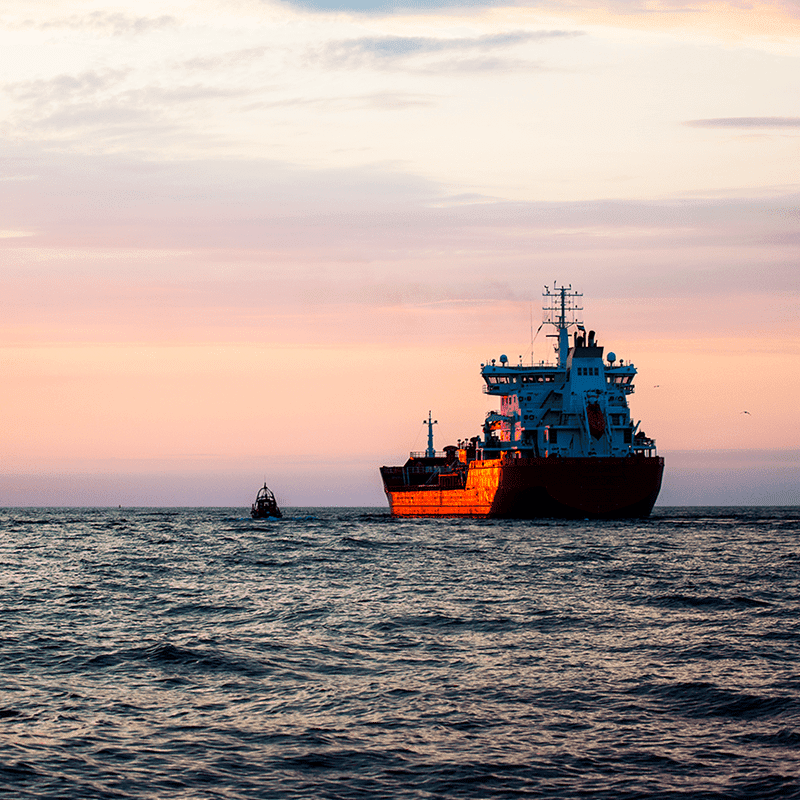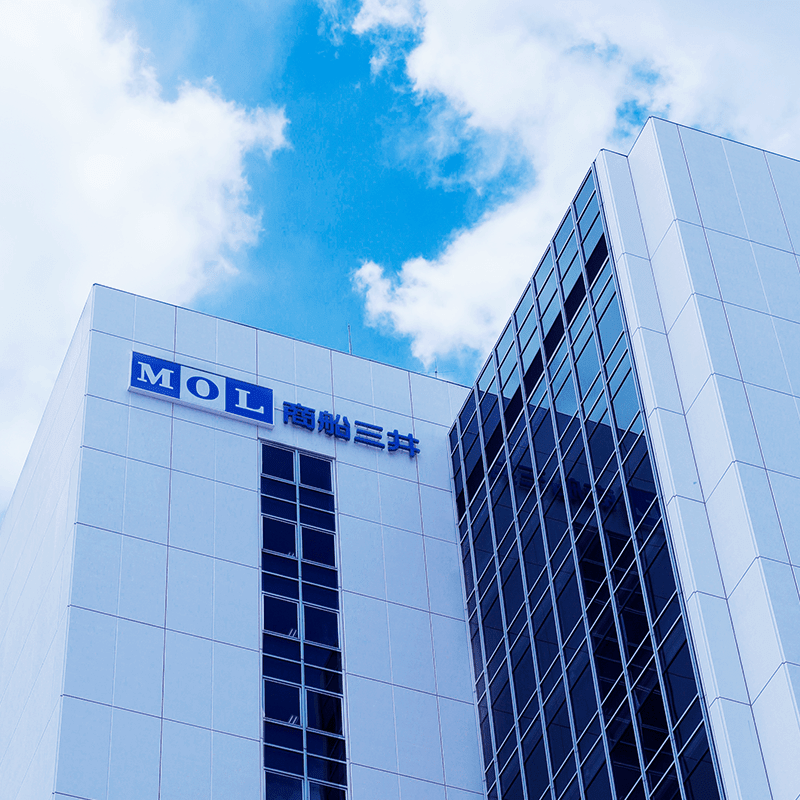BLOG
Seasonal measures for Stink Bugs in Australia
- General Shipping
2021.03.22

Australia is well known for its strict quarantine measures when entering its ports and unloading cargo. From 2019, quarantine measures against Brown Marmorated Stink Bugs (BMSB), which are agricultural pests, has been strengthened. This has had a major impact on the operation of car carriers and conventional ships. In these circumstances, Mitsui O.S.K. Lines (MOL) became the first Japanese shipping company to be certified under the Vessel Seasonal Pest Scheme (VSPS) in August last year, after it was judged that the company's efforts to deal with stink bugs on its vessels and cargo met the standards set by the Australia's Department of Agriculture. In this blog, we will introduce the active battle against stink bugs that has been waged to date.
How are stink bugs regulated?
Australia's Department of Agriculture has traditionally designated North America and European countries, which are the main habitats of stink bugs, as high-risk countries because stink bugs are harmful to agricultural product such as fruits and vegetables. During the 2020-2021 period, vessels that berthed at, loaded, or trans-shipped from target risk countries on or after the 1st September 2020 and arrived in Australian territory on or before 31st May 2021 had to comply with pest regulation requirements such as heat treatment, methyl bromide fumigation, and sulfuryl fluoride fumigation for vessels and goods during the BMSB risk season.
In 2020, Target Risk Countries totaled 36 countries, including Japan. In the case of Japan, no treatment for cargo was required, and heightened vessel surveillance was the only measure applied.
Stink bug habits
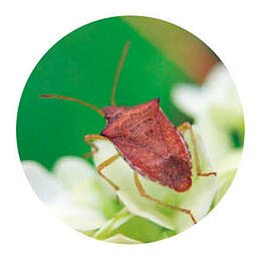 More than 1,000 species of stink bugs have been identified worldwide, with more than 90 species confirmed present in Japan. The particular species of stink bug that poses a problem for maritime transport from the Far East, including Japan, is the so-called Brown Marmorated Stink Bugs (BMSB). The BMSB goes into hibernation when the temperature drops below about 15 degrees Celsius, and wakes up and becomes more active as the temperature rises.
More than 1,000 species of stink bugs have been identified worldwide, with more than 90 species confirmed present in Japan. The particular species of stink bug that poses a problem for maritime transport from the Far East, including Japan, is the so-called Brown Marmorated Stink Bugs (BMSB). The BMSB goes into hibernation when the temperature drops below about 15 degrees Celsius, and wakes up and becomes more active as the temperature rises.
How do they get inside ships?
During hibernation, the BMSB uses not only the outdoors, but also houses, automobiles, construction machinery, and bulk cargo as areas for hibernation, meaning sometimes cargoes are shipped with hibernating bugs inside. It is difficult to identify the time and route of infestations, and it is not always easy to deal with as the bug can infiltrate narrow spaces that are easy to miss in visual inspections.
In addition, due to the bug’s behavior of waking up from hibernation and becoming more active as the temperature rises, quarantine inspections by the Australia's Department of Agriculture is particularly strict for vessels that load at ports in the Northern Hemisphere and call at Australian ports in the Southern Hemisphere from around October to around January, and depending on the results of an inspection, there may be a significant impact to the vessel's operating schedule.
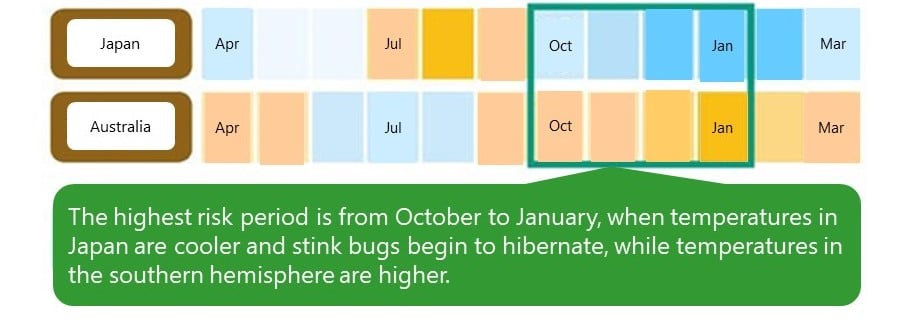
MOL’s countermeasures against stink bugs
MOL has been implementing various measures against stink bugs in consultation with agricultural pest experts, Australia's Department of Agriculture, and other relevant parties. These include, for example:
・ Thorough cleaning inside cargo holds before loading cargo.
・ Appropriate ventilation during cargo loading operations (to prevent stink bugs from entering through the frontage of a cargo handling lamp).
・ Searching the cargo hold by the crew during the voyage.
・ Timely and detailed information sharing with Australian officials on whether or not stink bugs have been found.
In addition, as a new measure this season, we aim to limit the impact of high risk areas by segregating cargo holds with Insect Nets in order to maximize the number of vehicles that can be safely unloaded and minimize the risk of schedule delays in unloading operations.
 Thorough cleaning of cargo hold before loading cargo
Thorough cleaning of cargo hold before loading cargo
 Checking for stink bugs during the voyage (at sea)
Checking for stink bugs during the voyage (at sea)
MOL becomes 1st Japanese Car Carrier Operator to obtain a VSPS Certificate
MOL is the first Japanese shipping company to be certified under the Vessel Seasonal Pest Scheme (VSPS), as mentioned above, based on the assessment that the initiatives implemented by car carriers on routes from Japan and Korea to Australia meet the standards set by the Australian’s Department of Agriculture. As a result, quarantine inspections at ports of entry in Australia are expected to be smoother, reducing the risk of delays in unloading loaded vehicles and contributing to an improvement of service quality for customers.
This year's high-risk season is about to end with no major delays in unloading thanks to the success of the above measures, and we will continue to apply our measures until the end of this season. We will review our activities at the end of this season to further refine our measures for the next season.
Measures to quarantine vessels calling at Australian ports
We have so far focused on car carriers, but car carriers are not the only vessels that call at Australia’s ports. MOL also faces similar problems with conventional vessels, such as railroad-rail transport handled by MOL Project Heavy Cargo (MOL PHC).
As a countermeasure to the different problems these cargos present, MOL conducts prior inspections by surveyors at the port of loading, daily checks by crew members, and appropriate fumigation at ports en route by a company approved by the Australian officials.
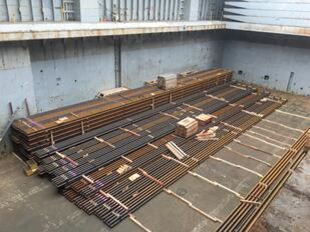 Ship loading railroad-rails
Ship loading railroad-rails
Our car carrier transport service “MOL ACE”
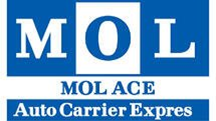
As a sustainably growing company contributing to Australia's social and economic growth, MOL has an ongoing commitment to initiatives that reduce pest risks to the nation's agricultural industry during the transport of automobiles and other cargo. MOL is also committed to implementing a variety of safety measures to ensure the safe and reliable delivery of cargos entrusted to us.

Writer:Ayu
Joined MOL in 2008. I’ve been in charge of operating oil tankers and bulk carriers for abt 7 years. And now I am currently involved in the operation of this site, in the marketing department.
I'm also in charge of managing MOL’s LinkedIn account. Please follow us! My favorite is K-Pop music :)
Recommended Articles
2022.07.05
- General Shipping
2021.04.13
- Energy
2025.03.18
- General Shipping
2021.08.07
- Eco Friendly
Latest Articles
2026.02.02
- Eco Friendly
- General Shipping
2026.01.20
- Eco Friendly
- General Shipping

